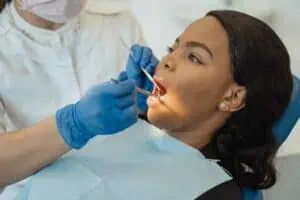 Cavities are not only common in kids, but they can also affect adults in large numbers. In fact, according to the CDC, 90% of adults over 20 have had a cavity in their lifetime. Additionally, one out of every four adults between the age of 20 and 64 currently have at least one cavity. The good news is that your dentist in El Paso can often spot and treat cavities before they become serious and require additional treatment. But there are some key signs of cavities that you can look for in between appointments.
Cavities are not only common in kids, but they can also affect adults in large numbers. In fact, according to the CDC, 90% of adults over 20 have had a cavity in their lifetime. Additionally, one out of every four adults between the age of 20 and 64 currently have at least one cavity. The good news is that your dentist in El Paso can often spot and treat cavities before they become serious and require additional treatment. But there are some key signs of cavities that you can look for in between appointments.
Tooth Sensitivity
One of the most common signs of tooth decay is new or more severe tooth sensitivity. While tooth sensitivity can occur when you’re eating or drinking something hot or cold without a cavity, extreme zings of pain after enjoying something hot or cold may be a sign of decay. Additionally, another sign of a cavity is if you experience tooth sensitivity after eating a sweet, sugary treat. Why? Well, when tooth enamel is weakened by decay, it can expose the tooth roots to things that cause pain – such as heat, cold, and sweets.
Tooth Discoloration
While tooth discoloration can be caused by any number of things, discoloration may also be a sign of decay. Usually, when we think of tooth decay, we think of dark spots, but a cavity can also start as a new white spot. Over time, the area may start to become darker, and that’s a sign that it’s time to see your dentist in El Paso. As with all dental problems, decay can become serious quickly, so it’s important to keep an eye on your teeth to look for any changes in color and schedule an appointment with your dentist if you suspect decay.
Tooth Pitting
Cavities are essentially holes in the teeth where decay has worn away enamel. Even though some cavities can be seen or felt by searching for new areas of pitting, many times these pits or holes are so tiny that they can’t be seen with the naked eye. However, your dentist in El Paso has special tools and techniques that can spot a pit easily, even if it’s super tiny. In fact, the smaller the pitting the less severe the cavity is, so it’s ultimately a good thing if you can’t see or feel it. Now, if you do see a new pit or hole in your tooth, it’s important to schedule an appointment with your dentist sooner rather than later. After all, early treatment often means easier treatment and reduces the chance of a cavity-causing bigger issues.
The best way to protect yourself from getting cavities is to make sure to brush and floss regularly and see your dentist at least twice a year. Not only will you get a thorough, gentle cleaning at these visits, but they’re also a great way for your dentist to check for any early signs of decay.
He was excellent and pulled my wisdom tooth in less than 2 min. w/o chipping it. The service was good too.
Great dentist experience! While they do take my insurance, unfortunately, they are not part of my network, however, I liked them so much I will continue to see them.
We were very impressed with the helpful and friendly staff at this dental office.
I was very impressed and thankful with the service provided.
I’m 60 years old and I hated to go to the dentist, and put off going for a long time. But let me tell you Dr. Rizk is the best dentist I’ve ever had. I would of gone years ago. A no pain Dr. – thank you!
I frequently talk to my patients about the different types of dental crowns available to restore their teeth. Understanding the different crown materials available helps you make an informed decision about your dental care. Let me share my professional insights about your various crown options and help you determine which... Read More...
As a dentist practicing in El Paso, I often discuss dental crown cost without insurance with my patients. I understand that cost considerations play a significant role in dental treatment decisions, and I believe in providing transparent information about pricing and payment options. The dental crown cost without insurance typically... Read More...